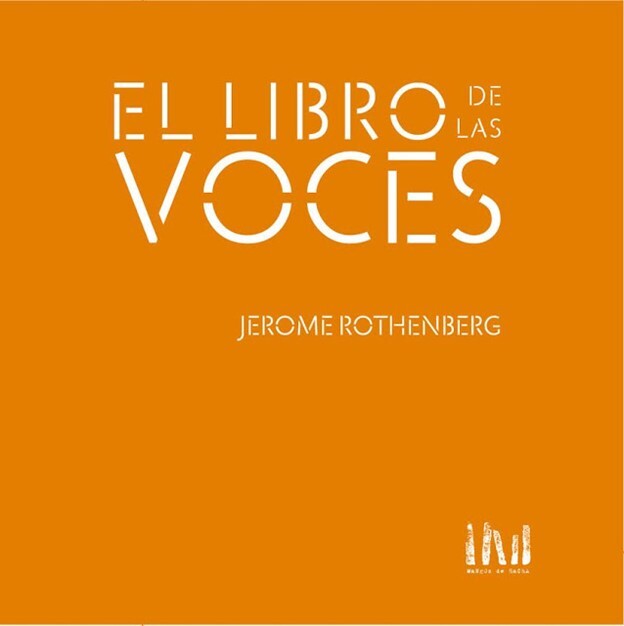Jerome Rothenberg and Javier Taboada
El libro de las voces (a new book from Mexico)

[Just published by Mangos de Hacha and Universidad Autónima de Nuevo León in Mexico, the book consists of extended interviews along with poems, essays, correspondence, and performance & visual works, selected and translated from English by Javier Taboada. What follows is the English version of my own preface and opening poem, to give a small sense of what the book is intended to include. (J.R.)]
PREFACE
It was the genius of Javier Taboada to recognize that I had come far enough in my life and work — further in fact than I would ever have imagined — to take account of what had happened to me and, even more, to the world we share, during the many years of my residencia en la tierra. Our determination, as we set out on the dialogue presented in these pages, was to stay resolutely in the present while “looking backward to move forward” in the words of the Cree Indian Trickster that I had helped to chronicle elsewhere. And it was in the course of talking together that we realized that what our talking had uncovered could be a true “book of voices” that would be completed with a range of selections from my work — in all genres — as a supplement to what the talk/the interview/the dialogue was allowing me to say.
The central point of the book — if a central point is needed — is that the work of each of us carries within is the traces of other voices, for which we can act as willing conduits or custodians, or which are simply there, whether we will it or not. This otherness — in the sense in which Rimbaud spoke of “I” as “other” — is sometimes obvious, as with translation or collage in specific poems as such, or, as a further example of othering or ghosting, what anthologies or free-form assemblages make possible for poets like me.
In what follows, Taboada has allowed me to elucidate, both in answer to his questions and by the juxtaposition of poems and other writings of mine as instances of how these interests play out in my own work and in the work of those poets — wherever found — to whom I feel closest. He has also drawn me to a consideration of how those works fit in (or fail to) in the actual world in which we live. In that way the “works” (my own and those of others) are observed from the immediate present, no matter how far into the past they take us.
Throughout, of course, my own voice is there, though open to question what such ownership or such a single voice entails. As a whole, too, Taboada’s well-composed book is a follow-up to two books of mine that I co-edited with Heriberto Yépez and that served as anthologies of my own previous writings: Ojo del testimonio: Escritos selectos (Editorial Aldus, 2010) and Eye of Witness: A Jerome Rothenberg Reader (Black Widow Press, 2013), quite different from each other and from the current interview-based volume. For me, the interviewing format opens up possibilities of currency that put my poetry and poetics into the immediate present and that allow me, in the process, to address the new century and millennium through which we’re now living. It also coincides with another large project on which Taboada and I have been working closely together: a historical anthology/assemblage of North and South American poetry “from origins to present.” That this project colors the interviews and poems that follow is also something to point out by way of introduction.
For that and so much more I am profoundly grateful.
Jerome Rothenberg
Encinitas, California
2019
I Come Into the New World
Voices are dumb until
I speak for them.
Knowing the sound
I find myself between
two fires. One
is dark green, one
the color of my mind
asleep. I come into
the new world
where the thought of death
no longer rankles.
It will be good to be
a stranger always
to know the terms by which
we visit back & forth
& sideways.
In the morning I will wear
a suit with shoulders
big as boards. My clothes are
silver plastic.
When I step into the car
it starts to fly.
I play games with
children
where I make
a nose
into an ear.
Like a clock my heart
moves closer
to the burning babe
& stays there.
I will now count
the century
by ones & twos.
This morning
all the voices in my dream
spoke with one voice.
I feel privileged to be here
among you.
From now on
we will live
on borrowed time.
January 1, 2000
Poems and poetics